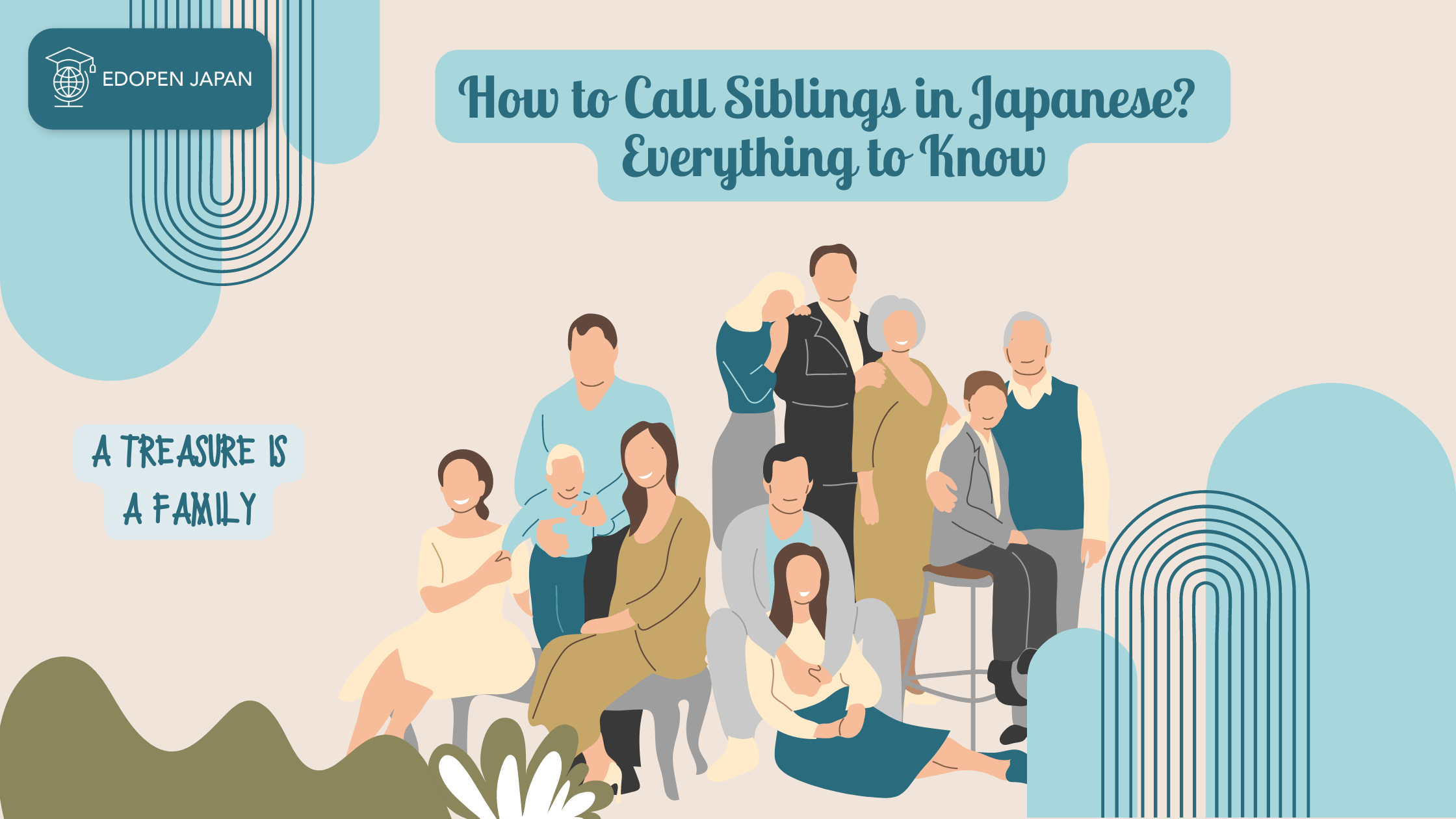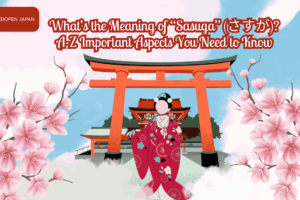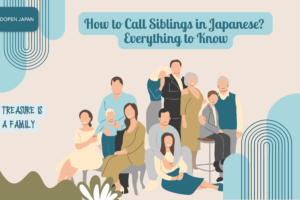Have you ever wondered what “Onii-chan,” “Onee-chan,” “Onii-san,” “Onee-san,” and other Japanese variations of siblings mean? If you’ve watched Japanese anime or comics, you’ll hear them a lot. Yes, these words are used in the Japanese language to refer to brothers and sisters, and are often heard in everyday life in anime.
In English, people are always called by their names. However, when Japanese people have an older brother or sister, they are usually called “Onii-chan” or “Onee-chan”. In this article, we will explain the meaning and difference of these words. Not only that, but you can also read the other article we present about Japanese and Japanese culture.
In addition, if you’re looking to learn other Japanese vocabulary and phrases that are very popular and used in everyday Japanese conversation, please see our recommendations below:
Read also:
How are You in Japanese: All You Need to Know
What is the meaning of “kudasai (ください)”?
11 Great Ways to Express Sorry in Japanese
Contents
- The history of the relationship “sibling” in Japanese
- How to call “sibling” in Japanese?
- Unique ways to classify the gender and age of siblings in Japanese language
- Similar words for brother & sister in Japanese
- Additional things to know about siblings in Japanese
- The variations on how to call siblings you can find in anime
- Summary
The history of the relationship “sibling” in Japanese
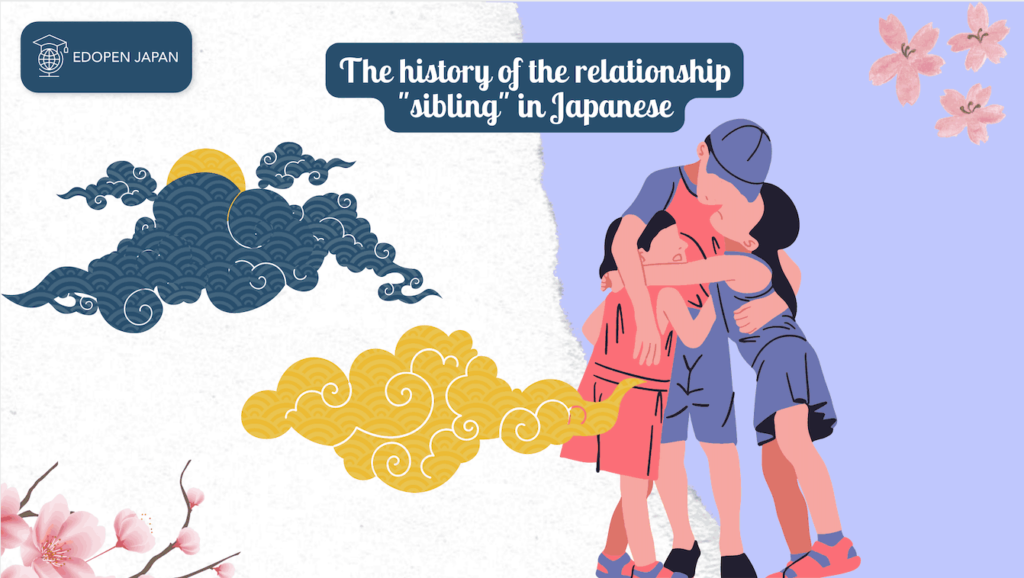
You may be wondering why there are so many different words for “sibling” or other honorifics in Japanese. This has to do with Japanese history. The relationship between brothers and sisters differs greatly between Confucian countries such as Japan, Korea, and China, and Western countries.
In Western countries, not only brothers but also colleagues are called by name, no matter how old they are or what their relationship is. On the other hand, in the sphere of influence of Confucianism, there is a concept of respect for age and seniority.
There is not just one brother, but many honorary titles such as senior and teacher. For this reason, Japanese and Chinese kanji are distinguished from siblings. In Japan, the culture of respecting elders is still deeply rooted, so different titles have probably evolved.
The difference between the use of ~san and ~chan
If you enjoy watching Japanese television or reading Japanese comics, you may have heard of kinship names such as “Otoo-san [father]” and “Okaa-san [mother]. In Japan, this name is used when the upper generation calls the lower generation. When the lower generation calls the upper generation, kinship names such as “Otoo-san” and “Okaa-san” are used.
Why does the younger generation in Japan not call the older generation by name, as opposed to other countries such as the United States? First of all, in Japan it is impolite to say “name” directly. The name has long been associated with the individual.
Therefore, the name was very “sacred”. Calling a person by name was considered very rude. Because it was meant to control the person. As a result, many kinship names were used. From that time on, even among family members, they began to use “relative names”. Instead of calling their superiors by name, this custom has continued to this day.
About the family name
The family names are based on the viewpoint of the youngest child. That is, from the point of view of the youngest child. Even if you have “Onii-chan [older brother]” and “Onee-chan [older sister],” “Younger brother” and “Younger sister” do not exist. So the names “Otouto-chan” and “Imouto-chan” are not used by anyone. But why is the youngest child the standard? This is to avoid confusion in the family at home.
If you have many families and a child is born, the eldest son who is named first is called “Onii-chan” by his parents. Then the eldest daughter is called “Onee-chan”. Depending on the youngest child, the form of address changes so that family members can understand them better.
How to call “sibling” in Japanese?
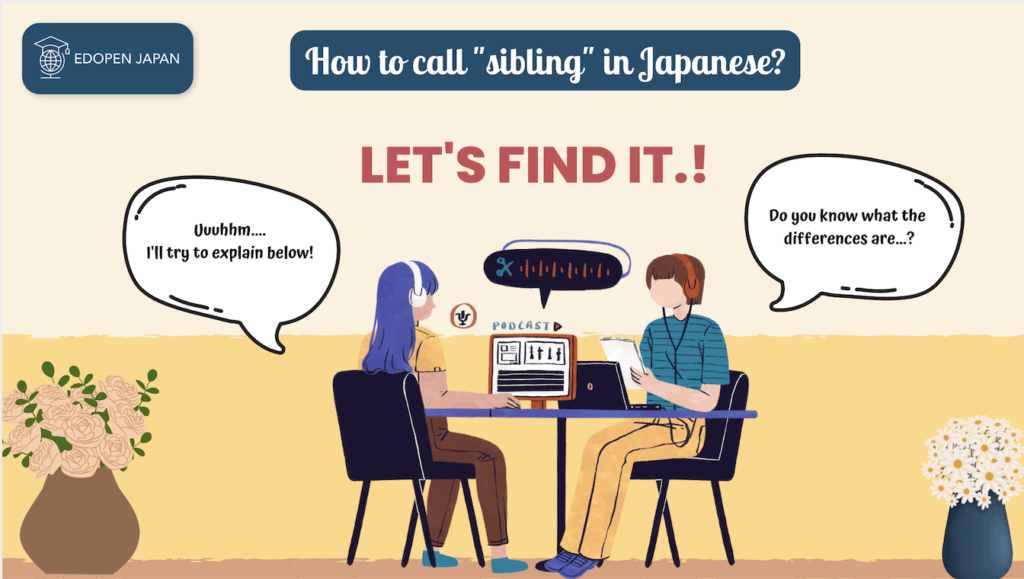
(1) What is “Onii-san”and “Otouto”?
While English does not distinguish between older and younger siblings, Japanese has words that classify both the gender and age (relative to the speaker) of a sibling. There are four basic terms as follows:
| 1. 弟 (Otouto) ~ Younger Brother | 2. 妹 (Imouto) ~ Younger Sister |
| 3. 兄 (Ani) ~ Elder Brother | 4. 姉 (One) ~ Elder Sister |
Then how do you call them? See the following:
| 弟 (Otouto) -> unchanged as ‘Otouto’ | 妹 (Imouto) -> unchanged as ‘Imouto’ |
| 兄 (Ani) -> Onii-san or Onii-chan | 姉 (One) -> Onee-san or Onee-chan |
“お兄ちゃん (Onii-chan)” and “お姉ちゃん (Onee-chan)” is nothing more than an informal way of talking about the older brother and sister. Onii~ literally means big brother and Onee~ means big sister. “Chan” is usually used for children or women younger than the speakers, but it is often used for intimate relationships or when you want to get closer.
The most formal and common is to use the prefix “San”, so we often hear the words “お兄さん (Onii-san)” for older brother and “お姉さん (Onee-san)” for older sister. The terms “Onii-chan”, “Onee-chan”, “Onii-san”, and “Onee-san” can be used as honorifics after the name, such as Kevin-oniichan.
These four terms are usually used when the speaker is describing siblings. For example, when the speaker refers to his older and younger brothers as follows
| Watashi no Ani or Otouto, respectively. (My elder or younger brother) |
Or if someone is describing someone else’s brother or sister. For example, Hanako’s younger brother, then the sentence will be:
| Hanako no Otoutosan. ~san to express respect |
(2) How to address siblings with the honorific expression?
In addition, “Ani” and “Ane” may take the honorific “O” to indicate further respect. These are usually used in conjunction with the honorific. “San” or “Chan” is the most common for all four of these titles. Although “Sama” is sometimes used to show respect for the older siblings.
These are used when the speaker is describing someone else’s older sibling. But also when addressing one’s own older sibling. Thus, the speaker may refer to his older brother (e.g., Kenta) as “Onii-san,” “Onii-chan,” “Kenta-Niisan,” and so on. Depending on how he sees Kenta, though, the most common form is a simple “Onii-san”. This is part of modern Japanese etiquette.
While in English it is normal to address older siblings by their names, in Japanese it is a serious breach of etiquette if it is not accompanied by a familial term. It is similar to calling your parents by their names, and marks a distance between the two siblings. On the other hand, younger siblings are almost always called by their first names.
Unique ways to classify the gender and age of siblings in Japanese language
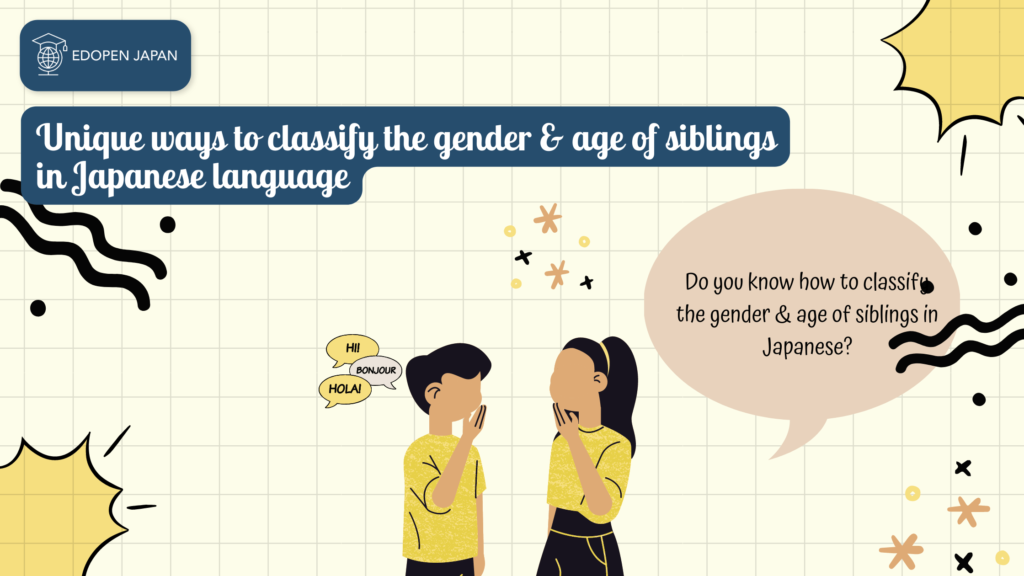
While English does not distinguish between older and younger siblings, Japanese has words that classify both the gender and age (relative to the speaker) of a sibling. There are four basic terms:
Kun’ and ‘Chan’ are the most common, although ~san and even ~sama are often used to show respect for older siblings or when addressing other people’s siblings.
In addition, Nii [兄] and Nee [姉] can be addressed with the honorific “O,” which shows even more respect. However, this is not mandatory. If you were talking to your older brother, you would address him as “Niisan” or “Oniisan. Older sisters would be called “Neesan” or “Oneesan,” and younger siblings would usually be called by their name.
Next, these four basic words have numerous variations due to regional differences in pronunciation and colloquial usage. Here are some of the alternate versions of nii [兄] that you may encounter in manga and anime, to name just one example:
| 1. Oniisan [お兄さん] or Oneesan [ お姉さん] > General term for older brother and sister. |
| 2. Oniichan [お兄ちゃん] or Oneechan [お姉ちゃん] > Term for older brothers and sisters. Signifying closeness. This is used as a term of endearment. |
| 3. Oniisama [お兄さま] or Oneesama [お姉さま] > Term for older siblings that is the most formal. It is considered an honorific name and is very respectful. |
| 4. Otouto [弟] or Imouto [妹] > term you would use when referring to your own younger brothers and sisters. It is quite informal. |
| 5. Otoutosan [弟さん] or Imoutosan [妹さん] > When referring to someone else’s younger brother and sister. The “san” makes the term much more respectful. |
Similar words for brother & sister in Japanese
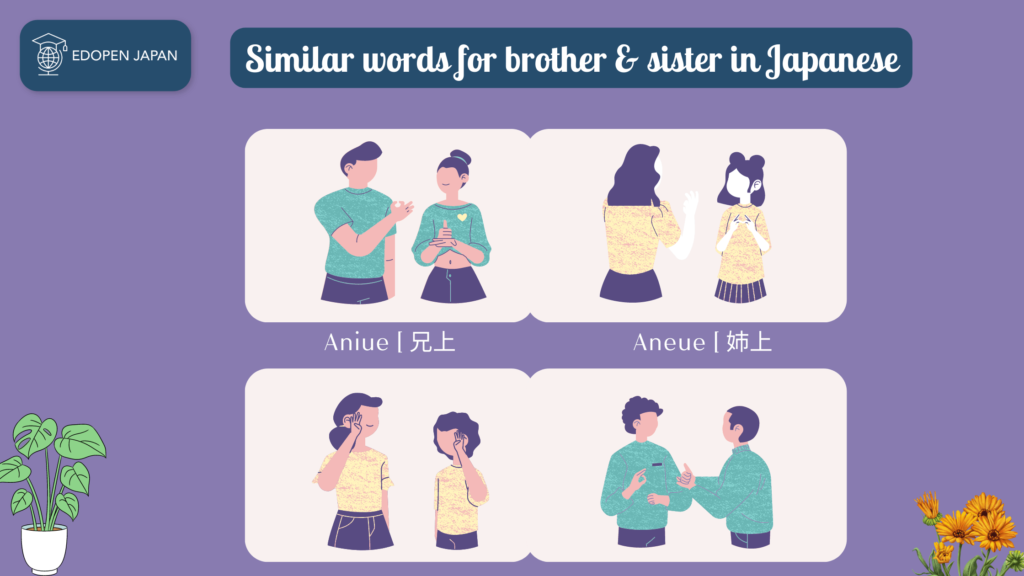
There are also several variations on how younger siblings can refer to their older siblings. These are the general, close, and formal conjugations. Various prefixes are added to the ends of many of these words to change their connotations.
Some of these can be considered synonyms for each other, but many have subtle differences in meaning, such as the distinction between “Bro,” “Big brother,” and “Older brother” in English. These are all listed below!
Along with their meanings, from Anime and TV Tropes. Note that the terms for older and younger siblings are used differently. Younger siblings often refer to older siblings as “Title”, but the reverse is much less common.
Older siblings tend to address younger ones by name. The words aniue and aneue have a more polite, respectful tone. Meanwhile, “Aniki” and “Aneki” are also a way of calling the “boss” of your gang. Usually the boss is a guy, so “Aniki”, but if the boss is a girl, then “Aneki”.
| Aniki [兄貴] / Aneki [姉貴]: Informal slang term similar to the English “Bro.”and “Sis”. It can also be used to refer to high-ranking gang members. |
| Aniue [兄上] / Aneue [姉上]: This is a very formal, but archaic and rarely used way to say older brother and older sister. |
| Oni [お兄]: This is a homophone for the Japanese word that means “ogre,” but can be employed as a pun for a joking way to refer to a brother or sister. |
(1) The summary chart to memorize terms related to siblings
To help you memorize the above lecture, please refer to the following table!
| Description | Elder Brother | Elder Sister |
| Keigo – Too formal – Sovereign | Onii-sama [お兄さま] | Onee-sama [お姉さま] |
| Sonkeigo (brothers from above) | Aniue [兄上] | Aneue [姉上] |
| Old fashion Formal – Daily life – Common | Onii-san [お兄さん] | Onee-san [お姉さん] |
| A little more informal | Nii-san [兄さん] | Nee-san [姉さん] |
| Without any respectful, informal suffix | Nii [兄] | Nee [姉] |
| Informal and diminutive suffix | Onii-chan [お兄ちゃん] | Onee-chan [お姉ちゃん] |
| Totally informal with diminutive suffix | Nii-chan [兄ちゃん] | Nee-chan [姉ちゃん] |
| Alternative to nii and nee | Ani [兄] | Ane [姉] |
| Precious, esteemed, honorable | Aniki [兄貴] | Aneki [姉貴] |
Also, “Aniue” and “Aneue” and “Onii-sama” and “Onee-sama” are rarely used in everyday life. This is because it is too formal. Now it is only used in Japanese anime. Most Japanese often use “Onii-san” and “Onee-san” as formal conversation.
And people say “Onii-chan” and “Onee-chan” for casual case. Also, “Ani”, “Ane” and “Aniki”, “Aneki” are only used for own family members, not for other family.
Additional things to know about siblings in Japanese
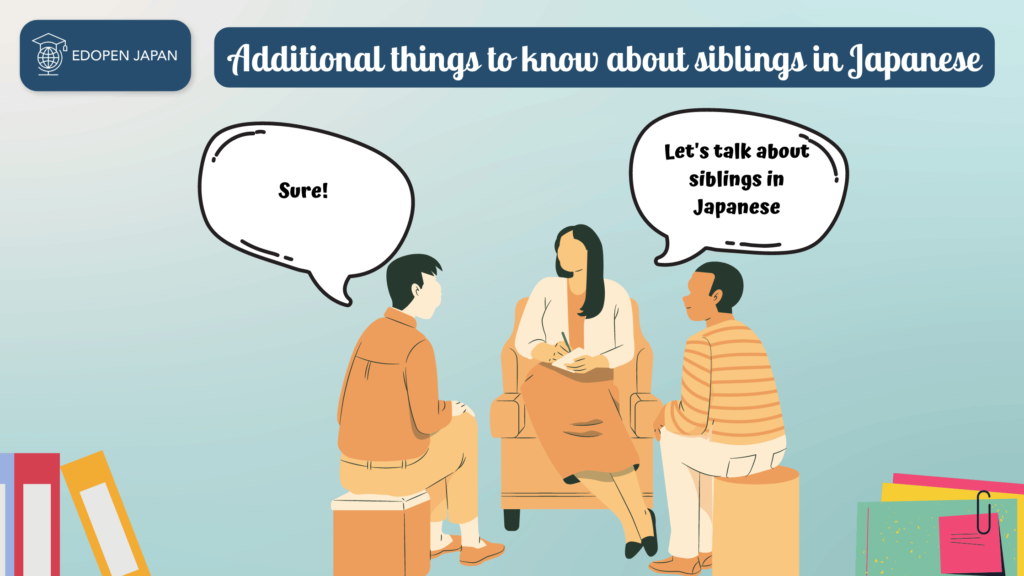
“Onii-san” “Onii-chan” and “Onee-san” “Onee-chan” is also not uncommon for sibling terminology to be used for certain non-siblings, such as sales clerks asking or calling situations.
For example:
| Chotto! “Onee-san! Kore doudesuka? Yasuidesuyo. ちょっと!お姉さん!これどうですか?安いですよ。 Which means, Hey! Mis. [Lady]! How about this? It’s so cheap! |
“Onii-san” and its variants are often used by children to refer to older non-relatives. This is difficult for translators; you want to stay true to the original, but you can’t have the child calling the hero “Big Brother” even though they’ve never met.
While the word “Onii-chan” is used in the Japanese language by a little sister or brother to refer to their actual older brother, this honorific has gained traction among non-Japanese anime and manga fans as a term of endearment for attractive male characters in the shows and comics, sometimes extremely inappropriately. It is close to the equivalent of an English speaker calling an attractive male character “Daddy”.
The variations on how to call siblings you can find in anime
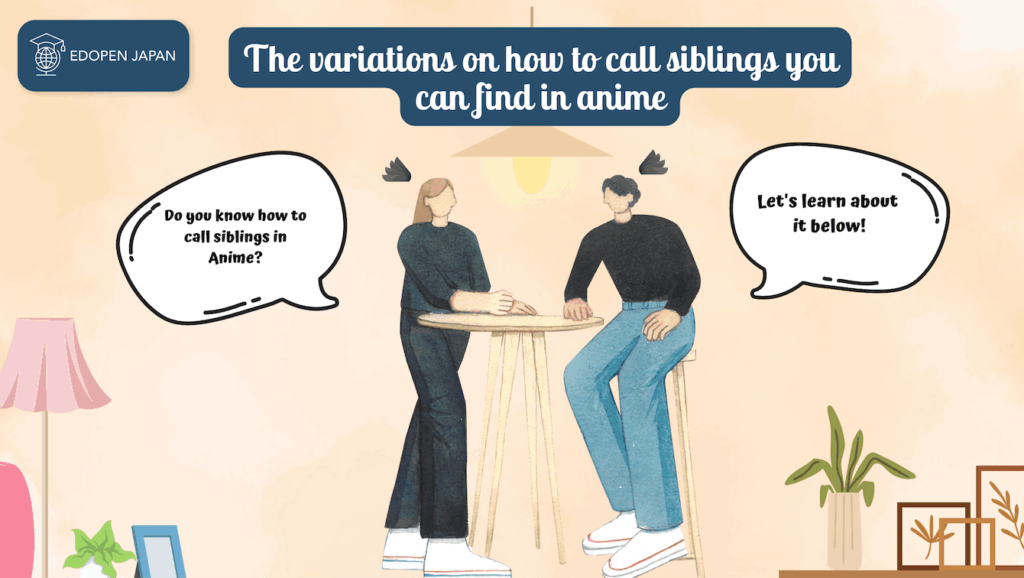
When you watch anime, you may hear the following ways that anime characters use to call their siblings. What’s your favorite? leave your answer in the comments section below:
| Anime Title | The Way to Call Siblings |
| (1) Magical Teacher Negima! | Chamo addresses Negima as “Aniki” given the ermine’s personality and habits, it’s almost certainly intended as the gang slang as much as the literal meaning. Negi also refers to his older cousin as “Oneesan”. |
| (2) Yu-Gi- Oh! | Marik Ishtar calls Ishizu “Nee-san”, and Yami Marik calls Ishizu the extremely respectful “Aneue- sama” (curiously enough, while he’s threatening to kill her. |
| (3) Naruto | Konohamaru refers to the title character as “Naruto-niichan”, giving an example of using older-sibling terminology towards an unrelated older kid one respects and admires. He also calls Naruto “Boss“. Hinata calls her cousin Neji “Neji-nii-san”, leading some onlookers to believe he is her older brother. Many fans interpret that as her considering him one. |
| (4) Flash Backs | The main character is always called Itachi “Nii-san”, which got translated to “brother” in the dub. Simon naturally uses “Aniki” to refer to Kamina on Tengen Toppa Gurren Lagann, though with the same amount of respect you’d expect from “Onii-sama”. The dub simply uses “Bro.” Kon likes to call Rukia “Nee-san”, but this is due to the use of the term as meaning “Hey lady!”. Ganju (youngest of the Shiba siblings) refers to Kaien, the eldest, as “Aniki” and older sister Kukaku as “Onee-chan”, while middle child Kukaku uses “Onii-san”. |
| (5) Gin Tama | Shinpachi addresses his sister Otae as “Aneue”; Kagura, despite not being related to either of them, calls her “Anego.” |
| (6) One Piece | Wapol calls his older brother Mushul “An-chan,” despite Mushul’s desire to be referred to with “Onii”. In the manga, Hancock’s younger sisters refer to her as “Ane-sama”. |
| (7) YuYu Hakusho | Kuwabara usually calls his big sister Shizuru “Aneki,” switching to “Neechan” when he’s sucking up to or teasing her. |
Summary
To summarize, please consider the following points:
- There are a lot of different phrases of how to call “Siblings” in Japanese.
- “Onii-san”, “Onii-chan” and “Onee-san”, “Onee-chan” are different meanings depending on who called it or the situation.
- It is better to learn basic “Sibling” phrase to begin with.
- Sometimes“Siblings” phrases such as “Onii-san” “Onii-chan” and “Onee-san” and “Onee-chan” are used by other not sibling people.
- “Aniue” “Aneue” and “Oni-sama” “Onee-sama” are rarely used in daily life, it is only used in Japanese TV or Comics, so, if you want to use it, keep in mind that.

